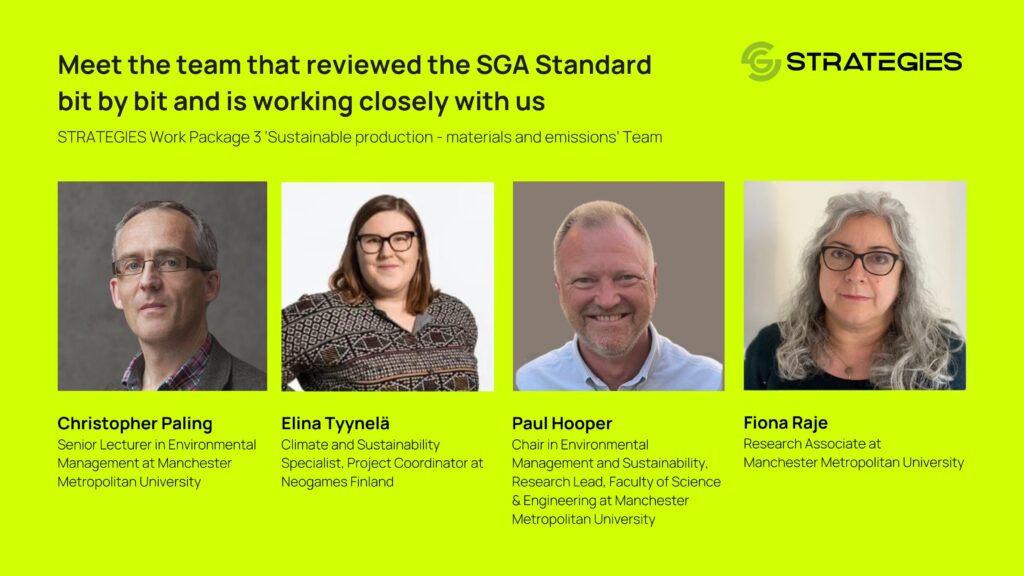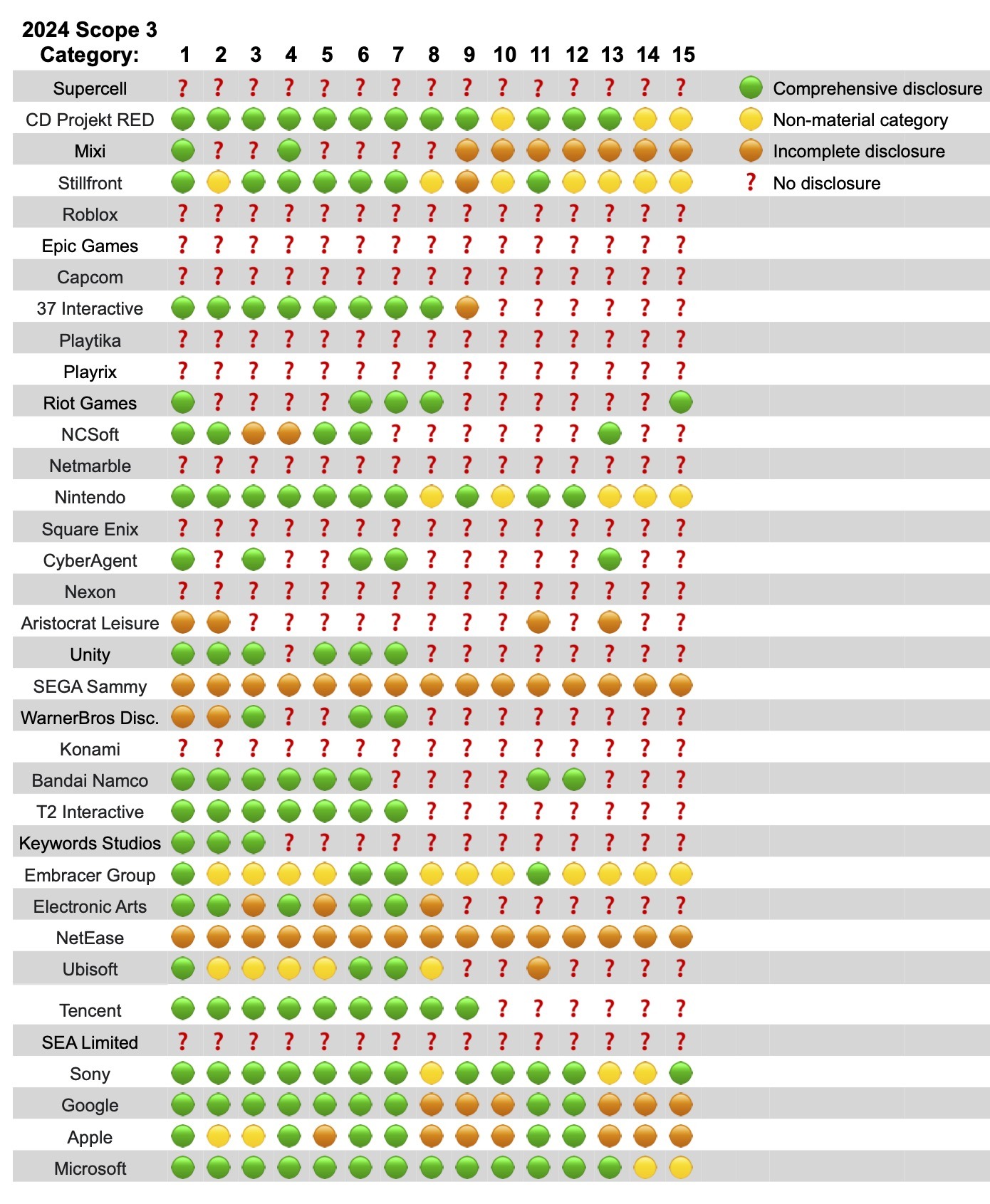The Sustainable Games Standard facilitates global operational optimization, improvements that cut costs and reduce environmental impact, cost- and time-efficient sustainability compliance, and actionable emissions reduction within the games industry. It has been built by game companies, local games associations and leading scientists around the unique needs of the games sector and its value chain.
The Sustainable Games Standard is designed to empower the entire industry to actively make gaming the most sustainable form of entertainment. It is structured into several components that offer activity-based insights and data relevant to different roles across the games industry—particularly developers, sustainability managers, and service providers—helping them better understand and optimize their work through a sustainability lens, with positive implications for business performance and emission reduction.
Jump to the role you’re most familiar with to learn more.







The Sustainable Games Standard enables developers to optimize energy consumption and extend battery life, reduce hardware load and optimize performance, enhance the player experience, and track emissions with accuracy specific to games.
It is covering everything from game design and server infrastructure to marketing and hardware, the framework
We encourage developers to especially use the following components of the standard, as these facilitate direct optimization benefits and improved energy efficiency.
Scope 3.9 Downstream Transportation and Distribution: Game Installs, Game Updates, End user devices, Scope 3.11 Use of Sold Products: Mobile, Console and PC, Scope 3.1 Purchased goods & services: AdNetworks, Data Centres
By enabling integration into game engines, platforms, and by service providers, SGA is paving the way for more strategic optimization and emissions reduction saving developers time and money by delivering better data, faster and with greater transparency freeing up capacities for studios to focus on creating more sustainable, just better games.
In addition to the Standard itself, SGA offers a collection of current best practices, resources, and workshops aimed at improving energy efficiency without compromising the player experience.
The Sustainable Games Standard is a games industry-specific interpretation of the GHG Protocol, designed to reduce the burden and complexity of complying with environmental, social, and governance disclosures required by multiple jurisdictions worldwide. The initial focus is on meeting the requirements of the European Union’s Corporate Sustainability Reporting Directive (CSRD) and the European Sustainability Reporting Standards (ESRS). Starting with environmental impact, the standard will address additional required topics one by one.
EU Legislation: CSDDD, CSRD, EU Green Claims Directive, Unfair Commercial Practices Directive, EU Energy Efficiency Directive
U.S. California Regulations: SB253 & SB261 (Climate Corporate Data Accountability Act & Climate-Related Financial Risk Act)
UK Standards: ISSB standards
It enables detailed games industry specific measurement and reporting of Scope 1,2 and Scope 3 emissions.
Double Materiality Analysis (DMA): Ensuring companies assess both financial and societal sustainability impacts.
Impact, Risks, and Opportunities (IRO): Aligning ESG reporting with business strategy and risk management.
Value Chain Sustainability Framework: Helping companies measure Scope 3 emissions, supplier risks, and cloud computing impact in a standardized way.
Reducing compliance burden, enabling efficient global data collection, and minimizing reputational risk and costs for individual game companies.
Confidential for sustainability metrics, making data collection and reporting more cost-effective while enabling data-based and actionable suggestions for improvement.
By connecting industry experts, we help companies share strategies and methods for addressing sustainability challenges. This collective approach lowers financial and operational costs of individual companies.
Enables to influence service providers and policy makers saving individual companies time and money. Fosters a more impactful and transparent industry-wide response to sustainability, strengthening the public perception of the gaming sector.
Enabling better understanding of emissions and actionable reduction measures, optimization and control of emissions. Facilitate setting long-term reduction targets by improving on estimates based on averages and time-of-use.
Rather than merely reacting to shifting regulatory landscapes, the SGA leads the sustainability regulatory conversation together with its partners. This proactive stance reduces the uncertainty and financial strain of constant regulatory changes, saving both time and money.
The Standard is open-access and publicly available for use by the entire games industry and beyond. Game companies can leverage the methodology and templates as-is to enhance their internal processes and reduce consultancy costs. Consultants and toolmakers can also elevate their services by integrating this industry-specific standard into their offerings, tailoring them to meet the unique needs of the games industry.
The globally standardized approach enables comparability of data, a clearer, data-driven understanding and strategic approach towards the impacts of the entire industry and its partners. It facilitates strategic, systematic emissions reduction at the industry level, extending beyond the individual games company level.
The multi-university, HORIZON EU-funded research project STRATEGIES is reviewing the SGA Standard working closely with the SGA. Since the beginning of 2025 we hold fortnightly meetings with the Work Package 3 ‘Sustainable production – materials and emissions’ Team, receive their input and advice on our current projects and practical challenges. Likewise, the SGA shares expertise and insight into the latest developments in the games industry itself, informing their research design and plans for their project partners.
Crucially, when work on a component of the SGA standard is close to finalisation, the latest version of the documents are handed over to the WP3’s team of experts in carbon accounting and public standard development. They then spend time reviewing the latest component, providing feedback and suggestions and ensuring that the SGA Standard also lives up to the high expectations of civil society.

There are several reasons why a standard for games’ environmental impact is needed. As the world’s leading entertainment industry, games have a responsibility for the impact that they have, and as research conducted by the Yale Program on Climate Change Communication found, a majority of gamers in 2022 already believed the industry has a responsibility to address its own emissions.
In the same year, the largest games companies in the world disclosed over 14 million tonnes of CO2 emissions across a dozen of the largest companies, rising to 81 million tonnes when the footprint of tech giants like Microsoft, Sony, Google, Apple and Tencent are included.
This picture, however, is still incomplete, as the largest share of emissions – Scope 3 emissions also known as value chain emissions – are not consistently measured and disclosed.
The SGA Standard proposes to align game businesses in their approach to measuring and disclosing Scope 3 emissions, enabling greater and more strategic action to reduce their impact.

Sustainable Games Alliance is a member-governed non-profit cooperative. Join now and proactively make gaming the most sustainable form of entertainment.